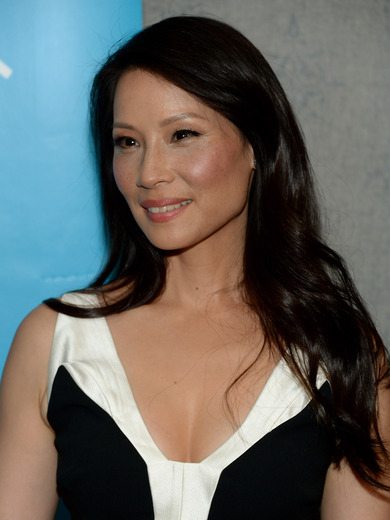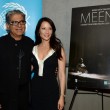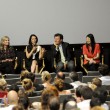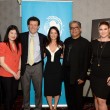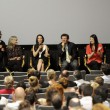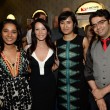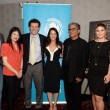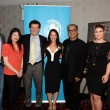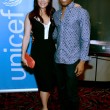On June 26, Lucy Liu and The Sibs (Megan Raney Aarons & Colin Keith Gray) debuted their documentary film, “Meena”, worldwide in New York as well as online.
“Meena” is an adaptation from a chapter of the book, “Half the Sky”, written by Nicholas D. Kristof and Sheryl Wu Dunn. The story is based on a girl who is forcibly sold into prostitution by her uncle, and her journey and experiences from an eight year old child to rescuing her daughter after she escaped the brothel. Although the film was only 20 minutes long, the content of the film was incredibly heartwrenching to watch and agonizingly moving. Layered on top of this already tragic storyline, was the transition from third to first person points of view and prominent sex scene that even an adult would find strikingly despairing to see; the directorial standpoints into making this movie significantly added value to the impact towards the public insight of sex trafficking.
Delivering the movie was no easy task as the filming took place in Mumbai, India and required the cooperation of many parties there. Despite the difficulties, the team of individuals behind this project, including Lucy Liu, have strived to make human trafficking come into the public eye in releasing this film after four years of its creation. Lucy, an UNICEF ambassador for over ten years, and having already produced two films on child voilence (“The Road to Traffick” released in 2009 and “Redlight” in 2010), made an extra effort in making awareness to child voilence in giving a panel discussion after the screening, alongside the authors of “Half the Sky” and Susan Bissell of UNICEF, to discuss the issues such as the ones reflected in “Meena.”
At the premiere, we were able to grab a few words with Lucy. Read our exclusive interview below:
How did the project come to you?
Actually, it was a project that came to me four or five years ago, it took them a long time to get it together. The producers wanted different people that were in the public eye direct the chapters from the book “Half the Sky”, so I was very involved in developing it and turning it into a story and it was going to be on PBS, but then they decided to do it as a documentary so that kind of went by the wayside. So this is the first opportunity to show the movie.
What challenges did you come across shooting the movie?
It was challenging. We had to shoot the movie in India, in Hindi. So not only was this my first time directing gig, but it was also something that was in a different language so we had translators and interpreters, we had children who were involved. There was a lot of violence, a lot of things that people would think was inappropriate for an eight year old to be exposed to, and so, we had to be very delicate when were shooting scenes and basically to take care of the children.
Which scene in the film did you want to put the most emphasis on?
In the editing room, besides how brutal and how difficult it was to watch a sex scene all the way through, something that was not consensual, they said it was too long and seemed like it was going on forever and I said, “Well it’s something I want to do, make it seem so in your face, so long and so extreme”, and it’s what these girls face all the time. So I kind of made an extra effort to make that into the movie. And we ending up keeping it now because I got more creative control over it.
What other issues other than human trafficking is important for you to bring awareness to?
I think there are so many other charity organizations that are doing such a great job. Obviously, UNICEF is an organization that I’ve been involved in for over ten years and I also think the Clinton Global Foundation does incredible work around the world. Every time I’ve been somewhere, an NGO, visited a mission there, the Clinton Global Foundation has sent over the drugs to save these children, they send it for free and to these places that are so remote in parts of the world. It’s incredible what they do. So I champion a lot of places that focus on the world, in a global manner, and for children as well because I think it’s a very important thing because children are going to be the next future generation.
Being such an influential Asian-American figure in our country, how do you find the inspiration to take on challenges and risks?
I feel like I have a drive to explore and a curiosity to continue to push me forward and I think you really have to take chances and take risks in order to really quench those curiosities and sometimes it takes you down the wrong road and sometimes it doesn’t. But if you don’t take a risk and attempt to do those things then you’ll never know, and sometimes they’re scary but hopefully you have a team of people behind you and you have faith to know that you can push forward, to understand that life is going to change and things are going to change and you have to be a part of that change.
Check out this great slideshow below of the event courtesy of Dimitrios Kambouris/Getty Images for UNICEF.
Credit: Tristen Yang
